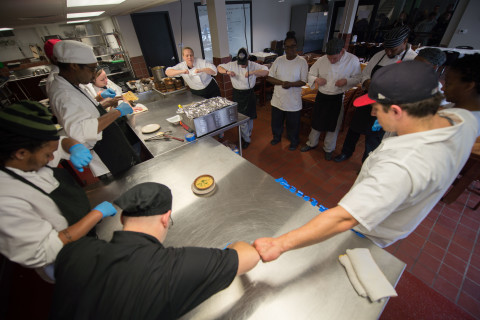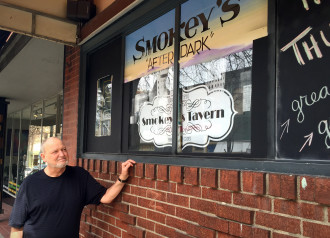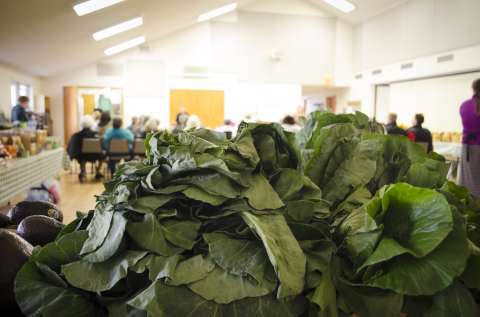The work week goes by fast and it’s not always easy to factor in time for a leisurely read. But if you’re looking to spend some time this weekend relaxing and getting caught up, we’re here to help. Here’s a roundup of Xpress‘ feature stories from the last week (or so). Happy reading!
Arts

LA Story: Former Ashevilleans grow their careers in California
By Alli Marshall
Asheville is more than just an address. Constantly changing, often inspiring and sometimes maddening, it’s played a role in the lives of some acclaimed artists (Bela Bartok, F. Scott Fitzgerald), while others (Thomas Wolfe, O. Henry) couldn’t seem to get away soon enough. And though those names date back to the 20th century, this mountain town continues to attract and foster creative types. But just because they get started here doesn’t mean Asheville is the right place for every artist to remain. (Continue reading)
Storyteller Connie Regan-Blake’s collection is inducted into the Library of Congress
By Alli Marshall
When Asheville-based storyteller Connie Regan-Blake embarked on her career more than 40 years ago, there were only two storytelling festivals in the country. That was in the mid-’70s; “Now every state in the nation has festivals, and North Carolina probably has six ongoing,” she says. As she made the rounds of folk music festivals in Philadelphia, Vancouver, Winnipeg and San Diego she recorded jam sessions with her cassette player. Sorting through boxes in recent years, she found those tapes and realized they contained vintage performances by tellers — some since passed away — who were famous in their fields. (Continue reading)

The Photography of Hugh Mangum: Beyond black and white
By Kyle Sherard
From the early 1890s until his death in 1922, Mangum, who was born and based in Durham, traveled all over North Carolina, Virginia and West Virginia, photographing anybody and everybody who lined up. From town to town he set up a temporary studio — a proto-pop-up photo booth of sorts — for up to three months. Families and individuals, young and old, black and white, rich and poor were among the thousands who sat for their portraits. (Continue reading)
Terrestrial perspective: Photo exploration at Castell Photography
By Kyle Sherard
Photography was only a fledgling art form in the early 1850s when it became a vital source for documenting otherwise unseen corners of the American West. Many of its first practitioners were using a method known as the wet-plate collodion process, a predecessor to the daguerreotype that required bulky and easily breakable glass plates, clunky horse-drawn darkrooms and minutes-long exposure times. Despite the technical difficulties, the resulting images — sweeping, magisterial views of plains and cliff sides — are unforgettable. (Continue reading)
What screams may come: Asheville’s evolving metal scene
By Max Hunt
Any examination into heavy metal in Asheville — one of the city’s least-heralded music subcultures — runs into the inevitable gray area of what metal music is. “It branches and refracts with various niche-metal scenes, some punk/hard-core vectored, some not,” says Eron Rex, publisher of ThrAsheville Zine, which documents the local music scene. “They all sound different, with each band having its own take on the genre.” This variety makes it difficult at times to tell who fits in where. (Continue reading)
Food

Why go on strike? An Asheville fast-food worker shares her story
By Pat Barcas
Johaunna Cromer will be walking off her job along with other Asheville fast-food workers who are mobilizing through the national Fight for 15 movement, which aims to send a message: Fast-food workers should earn a living wage in America and be treated better on the job. (Continue reading)
One meal at a time: Dinner at the Kitchen Ready table
By Jonathan Ammons
“All right, guys, let’s circle up!” barks chef Liam Luttrell-Rowland. “Let’s pray, and then let’s get to work.” White chef’s coats pop out from around every corner, circling the expo counter as his crew’s heads are bowed. During the past few weeks, these cooks have gotten used to serving three-course meals to whoever shows up. But there are no point-of-sale systems, uniformed waitresses or fancy, laminated menus here, because this isn’t your average restaurant. (Continue reading)
Salad days: Asheville chefs season our plates with budding greens
By Dorothy Foltz-Gray
The shy return of baby greens — kale, dandelion greens, watercress — elates our salad plates. And local chefs perk up as well.If spring greens mixed with whatever else is poking its head up in the garden feature among your cravings, Asheville chefs aren’t about to let your yens go unsatisfied. (Continue reading)
Raw deal? Asheville’s taste for unpasteurized milk
By Gina Smith
Twice a month, “Emma Gordon” (not her real name) pays a truck driver to make a run across the South Carolina border. The Asheville mom isn’t dealing in homemade moonshine or smuggling drugs, yet the product she brings to local families — raw milk — can’t legally be sold for human consumption in North Carolina. “It’s legal to buy in South Carolina,” Gordon explains, “so what we’re doing is … in kind of a legal gray area.” (Continue reading)
Living

New center aims to reduce addiction and mental health issues in Asheville
By Pat Barcas
A new 24-hour, urgent care center and crisis facility in Asheville aims to do more than place a Band-Aid on mental health and addiction problems. Smoky Mountain LME/MCO, which manages public funds for behavioral health and developmental disability services in Western North Carolina, plans to open the new Biltmore Avenue facility on Jan. 1, 2016, across from Mission Hospital. (Continue reading)
Retreats offer chance to go deep and recharge
By Emily Nichols
We all know someone who could use a break — and quite possibly, that person is you. We know how to pack our days full of activities, but how many of us really know how to stop, take time off and experience true rest? Instead, we tend to just keep going at a faster pace, doing our best to convince ourselves that this is “normal.” (Continue reading)
News

Mountain medley: Reflections on the 2015 Appalachian Studies Conference
By Max Hunt
In the popular imagination, the Appalachian Mountains have long been seen as a bastion of individualism and isolation. That sense of disconnectedness is part of these mountains’ romance, but it doesn’t tell the whole story and often ignores the similarities, shared heritage and goals of those inhabiting the peaks and valleys collectively known as Appalachia. (Continue reading)
Habitat ReStore’s secrets to success: How one local retail shop became a national leader
By Kat McReynolds
Books, toilets, rugs, records, glassware, furniture, building supplies. On first glance, the eclectic inventory at Asheville’s Habitat for Humanity ReStore might seem haphazard, but the organization itself is a well-oiled machine. Habitat for Humanity International recently ranked the Asheville ReStore second in gross sales among the parent nonprofit’s nearly 800 such retail shops. In fact, Habitat’s corporate headquarters, which mentors stores in other cities, has even begun looking to Asheville for answers. (Continue reading)

Honor system: Vance Monument restoration raises troubling questions
By Daniel Hall
Restoration of the monument was slated to begin in early April, managed by the 26th North Carolina Regiment, a Civil War re-enactment and historic preservation society. (Vance commanded the 26th North Carolina Regiment in 1861.) The project is expected to take three to four weeks, with a rededication ceremony to follow on May 16. But there’s another side to this story. “For me, as an African-American, it’s on par with memorializing Nazis as a Jewish person. I’m just never going to be OK with it,” says Dwight Mullen, a political science professor at UNC Asheville. (Continue reading)
End of an era: Smokey’s Tavern closes after 60 years
By Hayley Benton
Gene Masters stands in the doorway of Smokey’s Tavern, leaning over the barricaded sidewalk that’s blanketed with concrete dust — remains of the former BB&T garage next door. “After 32 years, it’s going to be hard to come back downtown,” says Masters, his voice shaking. “I don’t know if I will come back. It’s just about broken my heart.” Smokey’s brands itself as Asheville’s oldest continuously operating bar — “same location, same name, same everything” since the 1950s, Masters says. But after 60 years of beer and booze, Smokey’s is losing its lease: The downtown fixture will close forever on April 15. (Continue reading)
Sustainability

A community orchard brings a new green space to Hillcrest
By Carrie Eidson
Over the years, the Housing Authority of the City of Asheville has removed trees from Hillcrest, located next to future Interstate 26, for reasons including rot, potential damage to property and safety concerns. Other trees that weren’t cut down were trimmed back to prevent interference with the development’s security cameras, reducing shade coverage. The result is a neighborhood that can feel a bit barren. Hillcrest residents knew that the environmental nonprofit Asheville GreenWorks had planted fruit trees in Pisgah View Apartments a few years ago and hoped to see a similar project come to their neighborhood. Turns out, bringing an orchard to the public housing development was on the top of GreenWorks’ to-do list as well. (Continue reading)
The modern elder: Reclaiming what’s sacred in life’s later stages
By Jordan Foltz
From the Get It! Guide: As the boomer generation moves into elderhood, many are realizing what’s at stake when elders are lost from the social fabric. They’re aghast at the realities of our current model of care and are sparking a movement that seeks to redefine the later stages of life — not just for the benefit of elders but for the enrichment of all generations. (Continue reading)
Solar for sale: New legislation could mean cleaner, more affordable options for electricity
By Pat Barcas
The sun is shining on those who want more competition in the North Carolina energy marketplace. A series of bills recently introduced into the state legislature aim to not only diversify energy sources through independent solar sources, but provide incentive for energy efficiency through a tiered rate system. (Continue reading)
Hunger stops here: WNC’s war on food insecurity
By Carrie Eidson
From the Get It! Guide: Lynne Hillis was in her late 50s before she ever ate a winter squash or fresh beets. It wasn’t that she didn’t have an interest in healthy eating, but living on Supplemental Security Income means a limited budget for the Swannanoa resident — a budget that doesn’t allow for a lot of fresh produce. “Vegetables are more expensive than meat,” Hillis notes. “Even with food stamps, I can’t go buy vegetables.” (Continue reading)








Before you comment
The comments section is here to provide a platform for civil dialogue on the issues we face together as a local community. Xpress is committed to offering this platform for all voices, but when the tone of the discussion gets nasty or strays off topic, we believe many people choose not to participate. Xpress editors are determined to moderate comments to ensure a constructive interchange is maintained. All comments judged not to be in keeping with the spirit of civil discourse will be removed and repeat violators will be banned. See here for our terms of service. Thank you for being part of this effort to promote respectful discussion.